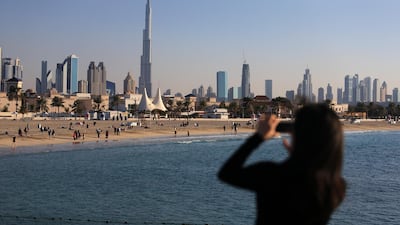Global aviation and tourism players meet this week at the Arabian Travel Market in Dubai to map out the industry’s post-coronavirus recovery, highlight the latest technology shaping the future of travel and discuss sustainability initiatives.
Air travel is recovering only sporadically as vaccine campaigns progress at an uneven pace around the world and governments tighten border rules to curb virus flare-ups.
A faster rebound will hinge on rapid vaccine distribution, key markets reopening their borders to international travellers, investment in digital technology, cheaper PCR tests and greener operations, analysts said.
“A successful roll-out of the vaccination programme, coupled with adaptability and speed, is vital to the resurgence of the aviation and tourism industries, with long-term competitive advantages,” said Linus Bauer, founder and managing director of Bauer Aviation Advisory.
“Thus, the Gulf region, especially the UAE, is in pole position to become one of the first economies to restart travel compared to other regions.”
Top industry leaders, ministers, airline executives and hoteliers will meet May 16 at the ATM, which organisers say is the first in-person travel and tourism event in the world since the onset of the pandemic.
The four-day event comes at a crucial time when the global aviation and tourism industry is battling to recover after the pandemic ravaged demand.
The International Air Transport Association widened its estimate of global airline losses for this year by a quarter as new Covid-19 strains and a slower pace of vaccinations in some regions pushed back the planned resumption of travel, according to its outlook in April.
Airlines are projected to lose $47.7 billion this year, up from a December forecast of $38bn but 62 per cent lower than last year’s losses of $126.4bn.
“Middle East airlines benefit from widespread vaccination in key home markets but suffer from a slow opening of the long-haul international markets that connect through the Gulf hubs,” said Iata.
The region’s operators are forecast to lose $4.2bn this year, down from $7.9bn last year.
Currently, the recovery is being led by domestic travel as international trips continue to struggle.
“For those regions such as the Gulf [and] Europe that rely very much on international markets, clearly it is going to be a slower path to recovery. But we know the restriction to recovery is the travel restrictions, so it is important that governments are able to lower those as quickly as the vaccination and testing regimes allow,” said Iata chief economist Brian Pearce during a briefing on May 4.
Held under the theme “A new dawn for travel and tourism”, the ATM exhibition will focus on the current state of the industry, progress on vaccinations and future trends.
Government officials and company executives will discuss how the pandemic has changed the industry and the way people fly.
A major shake-up looms that will affect every aspect of travel after movement restrictions are lifted.
Covid insurance, digital health passports, fewer routes, cabin reconfigurations, higher fares and pre-departure PCR tests are among some of the pandemic-induced changes ushering in a new era of travel.
“The coming ATM in Dubai has arrived at the perfect time, when the industry desperately needs an open forum to collaborate and forge a clear path towards a sustainable future,” said Mr Bauer.
"The importance of aviation and tourism to economic diversification and prosperity in this region cannot be understated."
Business activity in Dubai's non-oil private sector rose in April to its highest level since November 2019, driven by a rebound in the crucial travel and tourism sector and a rapid vaccination campaign.
The emirate’s seasonally adjusted IHS Markit Purchasing Managers’ Index climbed to 53.5 in April, from 51 in March, remaining above the 50-mark that separates growth from contraction and signalling a solid expansion in the non-oil private sector economy.
“Travel and tourism companies recorded the most notable bounce in performance amid increasing hopes of a rise in tourism activity later in the year, boosted by the rapid vaccine roll-out,” said IHS Markit chief economist David Owen.
Emirates, Etihad Airways and Air Arabia bosses have signalled their optimism about a revival in air travel during the peak summer season due to the rapid vaccination campaigns.
UAE hotels were the world's second busiest after those in China in 2020 due to government efforts to contain the spread of the Covid-19 virus, encourage domestic tourism and take measures to hasten the sector's recovery.
The country hosted 14.8 million guests who spent an average of 3.7 nights at 1,089 establishments last year for a hotel occupancy rate of 54.7 per cent, according to the World Tourism Organisation and the Emirates Tourism Council.
Dubai is "very optimistic" about attracting business travellers and holidaymakers as it prepares to host Expo 2020 in October. However, the pandemic is making it difficult to predict the number of overseas visitors, said Issam Kazim, Dubai Tourism chief executive.
More than 62 countries will participate at the ATM exhibition including Egypt, Saudi Arabia, Germany, Italy, Greece, Cyprus, Thailand, Indonesia, South Korea, the Philippines, Malaysia, the Maldives and Israel.
“This underscores the importance of ATM, connecting destinations with their source markets,” said Danielle Curtis, the exhibition’s director for the Middle East.
The 28th ATM exhibition will be held at the Dubai World Trade Centre, which can hold only 11,000 people at any given time due to social-distancing guidelines.


